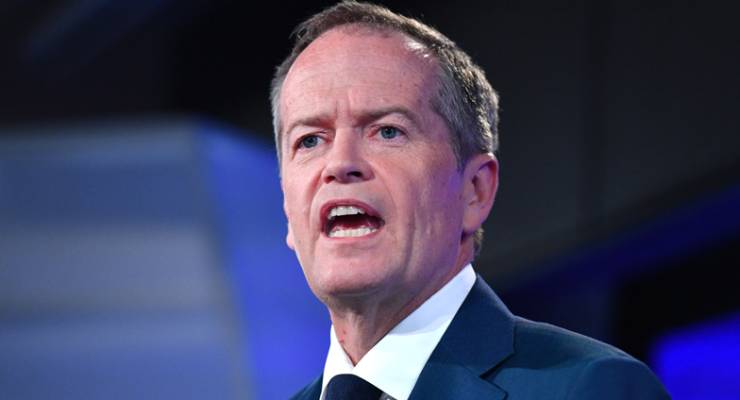
Bill Shorten and his team, evidently, know something the rest of us don’t know about schools funding that explains why Labor has adopted a “we refuse to be agreed with” strategy on Gonski. In question time last week, especially on Thursday, the opposition devoted most of its questions to the issue, including attacking the government on behalf of Catholic private schools. The days of the “Labor private school hit list” seem a distant memory.
But why Labor is stoutly defending the Catholic education sector, which has blatantly lied about the impact of the government’s big increase in education funding and which readily allocates taxpayer funding to richer schools ahead of poorer schools, is a political mystery that has stumped any number of commentators and even Catholic-educated MPs. Instead of celebrating the Liberals’ surrender on Gonski after years of resistance and multiple backflips, and promising even more funding for schools at the next election, Labor is fighting the package tooth and nail and insisting there’s a $22 billion funding gap.
One explanation is that Labor knows it is never going to lose votes to the Liberals on school funding, but it could gain votes, particularly in outer-suburban electorates, by defending the Catholic education system as well as public schools. Another is that, after Tony Abbott’s relentless negativity in opposition and government, Labor owes the Coalition exactly nothing and need brook no complaints about a lack of bipartisanship from Team Whyalla Wipeout.
Today’s Newspoll, showing no noteworthy shift in Labor’s substantial lead over the government, suggests Shorten’s political instincts might, at least initially, be better than those of the rest of us who have been convinced Labor should have declared victory and vacated the field. And it’s despite a certain rattiness creeping into the opposition, with a shadow cabinet leak — extraordinarily rare since the 2013 election — internal divisions over Labor’s budget tactics and sniping at Anthony Albanese’s public statements.
The Prime Minister calls the $22 billion funding gap “fantasy money”, and he’s right. It never had any status. And whatever the government funding plan lacks in terms of comparison with Labor’s notional spending figure, it makes up for by finally reversing the funding gap between wealthy private schools and the public sector — something Labor (understandably) lacked the political courage to do.
But as Abbott’s stint as opposition leader showed, fantasies can be every bit as damaging as reality, particularly when they play to voters’ perceptions. Labor is a big-taxing party, so why wouldn’t they impose a “big new tax on everything” that would wipe out the economy? Similarly, the Liberals don’t really believe in funding education properly, so why wouldn’t they “cut” $22 billion from schools funding?
Labor’s campaign has detracted from the focus on the governments higher education cuts, which have fallen out of the media cycle, although what looks like a difficult, if not impossible, passage through the Senate will restore them to public attention soon enough. But in effect Labor is campaigning hard in an area where it says additional funding isn’t enough, versus an area where real, and significant, cuts are being made.
The budget wasn’t designed to achieved an instant transformation in the government’s fortunes but to stop the rot and get voters to refocus on Turnbull, giving him another chance to rebuild credibility as a more centrist figure. So far, there doesn’t seem to be much evidence that is happening. And much will depend on an issue that was wholly absent from the budget despite its pressing importance — climate change. The government’s climate action review — the one that caused a blow-up in Liberal ranks when the terms of reference didn’t include taking climate science out the back and shooting it — isn’t due until the end of the year, but Alan Finkel’s energy security review is due “mid year”, which is now a matter of weeks. How that’s handled, and whether it leads to another explosion by flat-earthers within the Liberal and Nationals, will play into whether voters give Turnbull a genuine second look, or the budget proves a mere distraction on the way out the door for him.
Meantime, Labor is proving coldly cynical in fighting on on Gonski despite the government’s abject surrender. The last people who can complain about that are their opponents.








I sympathise with Labor’s cynical response to ‘Team Whyalla Wipeout’s ‘abject surrender’ on Gonski, but nonetheless hope for it to rise above such narrow short termery.
What is the difference between the govt’s 10 year projections and labor’s 22 billion shortfall that you describe as fanciful?
“The Prime Minister calls that $22 billion “fantasy money” and he’s right. It never had any status.”
Ergh, the money is there, Bernard. It’s about to be given away to corporations under the guise of tax cuts; with $43 billion to spare.
It’s a strategy that worked so well for Abbott …..
While agreeing it may be politically savvy, it’s also cynical bullshit. The education money doesn’t just need to be stumped up, it needs to cut for the over-compensated groups of schools. Gonski was supposed to be about funding on the basis of need.
This was going to help Labor get to where they needed to be, providing cover for less going to wealthy private schools and more to public education. It’s cynical, and it’s short term. That’s a bad look in my book, and questionable ethics. So what if the other team did it. That hasn’t cut it as an excuse since 3rd grade.
Sorry, meant to say that it isn’t ‘just about money being stumped up’. The problem at the heart of this is the lie that is the Howard era socio-economic statistics/formula used to justify giving money to highly resourced schools.